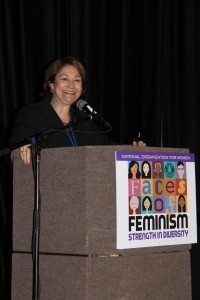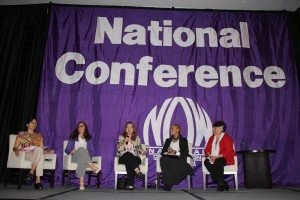Twice I have participated in women’s conferences, and both times I realized that I was the only Armenian there. More than 400 women recently participated in the conference organized by the National Organization for Women (NOW) from July 27 -29. Seven years earlier, I had gone to Valencia, Spain, to be a part of the “Women in Black” peace conference.
The participants at the NOW conference included delegates, board members, and some men who gathered to discuss national issues related to women. NOW is a grassroots organization that was founded in 1966 to provide equal rights for women. Today, the Equal Rights Amendment has yet to be passed. Men get higher salaries for performing the same duties at many jobs. NOW is a multi-issue, multi-strategy organization that takes a holistic approach to women’s rights.
Armenian women living in the U.S. are subject to the same issues and concerns as local women. We have to deal with discrimination, domestic violence, equal rights, and pay. How many Armenian women are involved in local politics? How do we raise consciousness about our issues?

There were also women from diverse ethnic backgrounds: African-American, Native American, Latinas, and from places like the Dominican Republic and India. All had the same concerns about women’s rights. As I was listening to the speakers, I thought about my Armenian sisters (women) in Armenia, U.S., and the diaspora. When they talked about domestic violence, it reminded me of Zaruhi Petrosyan who died in 2010 due to severe injuries inflicted by her husband and mother-in-law. Zaruhi’s case shed light on the domestic violence in Armenia and, as a result, the Coalition to Stop Violence Against Women was formed there. “Women’s rights are human rights” is what I heard during many of the workshops I attended.
In the 1980’s, I was working at an information and referral hotline where I talked to callers, assessed their needs, and referred them to organizations that could assist them. Several times I had Armenian callers in need of a place to stay because they had to leave their abusive husbands. Also, I had an Armenian man call to request court-ordered anger management classes. Of course, it took me a while to understand what he really needed; he was embarrassed to say he hit his wife and instead said he needed to attend some classes. As I probed more to see what kind of classes, I realized what had happened.
I tried to bring attention to domestic violence in the Armenian community, but I was faced with denial. The media did not want to touch it.
Later, when I moved from social work to teaching, I still saw domestic violence. One of my student’s father shot his wife and himself and left the three kids orphaned. Another mother ran to our school and asked for refuge. I called the Emergency Shelter Hotline and arranged a shelter for her and her three kids. Of course, after a few days she returned to her abusive husband. Only after postings in social media is our community talking about this issue. Zaruhi’s case was a wake-up call for all. After that incident, Datev Community Outreach was founded in Glendale to bring awareness to the Armenian community. Also, Armenian International Women’s Association has many services for women in Armenia focused on domestic violence. But we have a long way to go.
Armenian women living in the U.S. are subject to the same issues and concerns as local women. We have to deal with discrimination, domestic violence, equal rights, and pay. How many Armenian women are involved in local politics? How do we raise consciousness about our issues?

In the summer of 2007, I attended the “Women in Black” peace conference in Spain. Again, I was the only Armenian participating. “Women in Black” is a grassroots peace group started by Israeli women in Jerusalem in 1988. It was a reaction to the human rights violations by Israeli soldiers in the Occupied Territories. The women decided to hold a vigil every Friday in central Jerusalem, wearing black clothing in mourning for all of the victims of either side and holding signs with the slogan, “Down with the Occupation.” Later, many Jewish women who felt critical of the policies of the government of Israel formed their own, local “Women in Black” groups. Such groups took up a variety of local social and political issues, and the idea spread fast. It has now become an international movement. “Women in Black” has many active members in Belgrade, Serbia; in the 1990’s, they were confronted by violence from nationalists and persecution by police. They were called “witches,” among other negative names. The worldwide “Women in Black” network keeps in regular contact via e-mail and the internet and holds international conferences every two years. The movement has been growing in the United States since the war in Iraq, which is an important issue for many members of the movement. Some chapters also encourage men to participate, although the movement still consists mainly of women. Standing together in complete silence is a main activity of the group.
Armenian women need to get involved in grassroots organizations. Our daughters can benefit from our fights and activism. We have so many educated Armenian women who are active at some organizations, but it is essential to see them in a variety of American and international groups. We need community awareness for all, but only with women’s participation can we achieve equal rights and better working conditions. After all, women’s rights are human rights.


Great initiative, but not sure who is the writer and how we can be in touch with her or the organization NOW.
Please kindly clarify…
Not immediately obvious.
Thanks,
Of course, there is the general problem of non-participation of Armenians in general in Armenian organizations in the Diaspora.’
I am a bit wary of groups like NOW. You know, culturally, founders of NOW such as Gloria Steinhem are not necessarily in tune philosophically with the special needs of Armenian women in the Diaspora or Armenia.
There are Armenian women’s organizations, as the author points out. I think those may be a better fit.
Karine, just because an organization is made up of women does not mean it serves just purposes. Women in Black sympathized with the Arab terrorists who were murdering Jews. That is, it promoted the cause of Arab/Muslim terrorists, like Hamas. Did you forget that it was Muslims who perpetrated the Armenian genocide? Are you aware that Jews in Muslim lands were always inferior subjects to the Muslims? Both Jews and Armenians were in the inferior status of dhimmis in the Islamic empires. And now Judeophobes in the West hide behind Arab terrorists in order to finish Hitler’s work. And you collaborate with them!!
Women in Black never support any violent group. This International net was born in Jerusalem among Jews and Arab women whose interest was peace in the land where they were living, against the occupation of Palestinian territory for the Israel govermnet becuse it si the cause of all violence in the area. There ara women in Balck in both areas in conflict but they refuse becaem enemies, they are victims of the war and violence and say “Not in opur name” .
Please, see our Women in Black web and dont accuse of any violence.